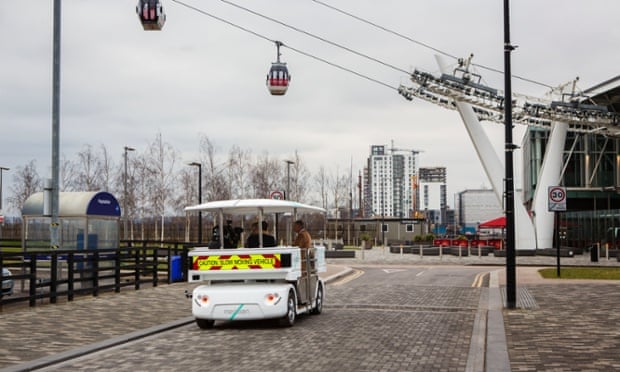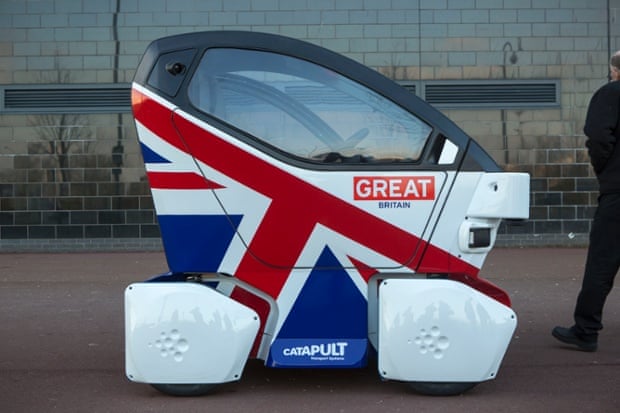Vince Cable believes trials in Greenwich, Bristol, Milton Keynes and Coventry, backed by £19m worth of government funding, could lead to £900bn industry
The prototype driverless cars to be tested in the heart of four British cities are unveiled on Wednesday, with the government claiming the nation is uniquely placed to lead the development of the technology.
An autonomous shuttle traversing the North Greenwich plaza beside O₂ Arena will mark a small but significant step on the way to what ministers and engineers hope will be a safer, less-congested, driverless future.
Business secretary Vince Cable said the trials, backed by £19m worth of funding from the government, would keep the UK at the cutting edge of automotive technology and should bring more highly-skilled jobs to the UK.
“The projects we are now funding in Greenwich, Bristol, Milton Keynes and Coventry will help to ensure we are world-leaders in this field and able to benefit from what is expected to be a £900bn industry by 2025,” he said.
A Department for Transport review of road laws has given the trials a green light. Three different autonomous vehicles will start operating from this spring in public urban spaces, in tests that will assess the public’s interaction with the vehicles as much as the evolving technology.
Transport minister Claire Perry said: “These are still early days but today is an important step. The trials present a fantastic opportunity for this country to take a lead internationally in the development of this new technology.”

In a sneak Guardian preview of the self-driving Meridian shuttle – a kind of elongated golf buggy with no clear front or back – the public reaction in Greenwich was mixed. Some passersby stared open-mouthed while others remained engrossed in smartphones, inadvertently testing out the vehicle’s automatic object detection and emergency stop. The vehicle is operated by selecting a programmed route on a touch pad, and with the aid of radar, cameras, light detection and ultrasonic sensors to ensure the path is clear, off it goes.
“It works like a bat,” said Pierre Lefevre, managing director of Phoenix Wings, which developed the shuttle. His aim for this technology was, he said, was “to remove private cars from being parked on the streets – but find a way of connecting people from the tube or train to work and residential areas.”
Eight of the Meridian vehicles will be trialled over the next two years.
An electric two-seater vehicle made in Coventry, emblazoned patriotically with a Union Jack livery, will also be unveiled. The pod’s sensory apparatus is linked up to a Macbook Pro in the back, which over three years will create 3D maps of its Sisyphean journey along the pavement between Milton Keynes railway station and the shopping centre.
Jez Coates, chief engineer at manufacturers RDM, which will build 40 more of the pods, said: “It’s possibly more difficult than the challenge that Google are taking on, because a pavement is not such a predictable environment as a road, with kids running about.”

The pod, while designed to be autonomous, for now retains a steering wheel and will have a driver during the tests. But Peter Marland, leader of Milton Keynes council, sees in the prototype an eventual potential solution to dwindling public transport budgets. He said: “We’re making £22m of cuts and a lot is from bus services. How can we get people around without using 60-seater vehicles? This could be a cross between a taxi and a bus.”
Yianni added: “With driverless cars, everyone imagines you tap in your destaination, sit back and read the paper and off you go. We’re about 10 years from that.”
Nick Reed, technical leader of the Greenwich project, agrees. “There are still technological obstacles – it doesn’t work well in snowy or foggy environments, and we are running vehicles here with a maximum speed of 12mph.” But he says, the more substantial challenge now is getting people, regulations and the driving environment ready for the change.
The Wildcat, a third autonomous vehicle that has been long in development by BAE systems, will be tested in Bristol.































